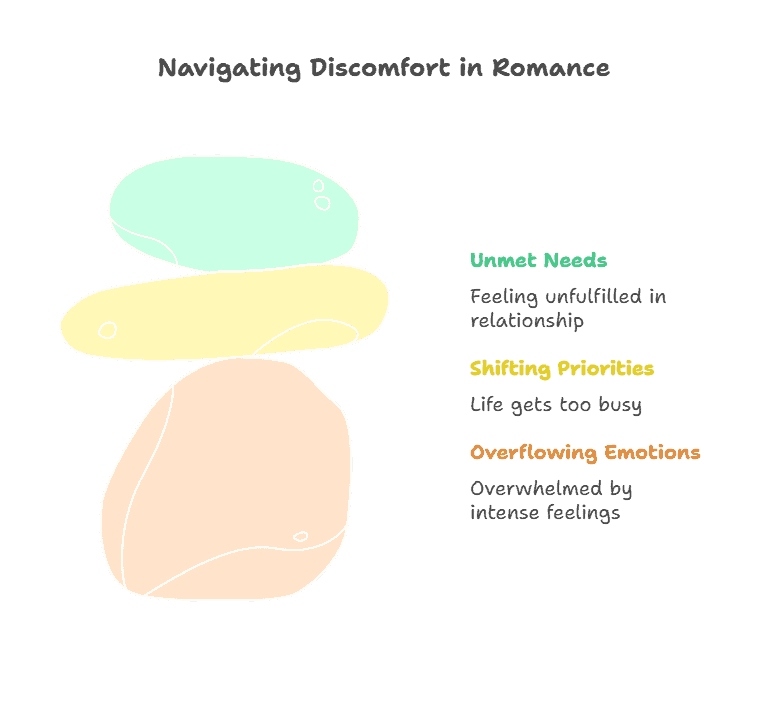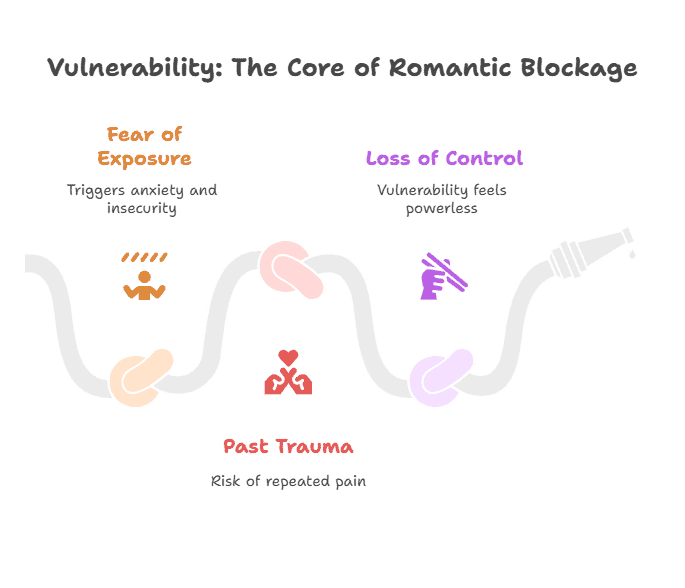If you’ve ever been startled by a hug that came out of nowhere, unconsciously turned away from showing love, or had a “romantic” intimacy that felt awkward, you have to know that you are not suffering from any disorder — you are just a human. Almost everybody, sometime during their lives, leaves in silence pondering the question: “Why Does Romance Make Me Uncomfortable?”. It is, however, not that the person does not love, but it is usually a mixture of overflowing emotions, changing priorities and unmet needs.
The real situation is that love sometimes loses its spark not for lack of affection but rather because life becomes so active and noisy — children, job, mental tensions, standards — and in the midst of all this, we lose the ability to be easy with intimacy.

When Love Becomes… Awkward
At the beginning of a romance, there were sparkles and butterflies and sending “good morning” texts; later on, it turned into grocery lists, deadlines, and whose turn it was to fold the laundry. It was not the case that the love was gone; it merely got hidden beneath the burden of reality. Eventually, the once thrilling things might slowly become unrecognisable or even discomforting.
Occasionally, you could be thinking, “What has happened to our relationship?” The response most of the time is found in the gradual but constant changes in our environmental factors, stress levels, and feelings. When duties become several and habits are hard set, the room for being spontaneous and loving gets less. With the addition of tiredness and mind noise, it becomes a little surprising that love has lost its allure and has become more of a task, like scheduling it on a joint calendar.
And here’s a humorous reality: now and then, the relationship might get awkward, not due to any problems, but because it has taken such a long time that it seems strange — just like attempting to dance after learning the steps. You already have the song, but you are not in sync.
Common Reasons Romance Starts to Feel Uncomfortable
1. Fear of Vulnerability
Being open to each other in all aspects is what romance demands — to show feelings, to open a person up to one’s, and to take the chance of being noticed. For a lot of people, that is a nightmare. Being vulnerable implies that you are giving up power and control, and a person who has suffered, been rejected, or mocked in the past would consider it risky even to show small signs of love.
Being emotionally “naked” can trigger the same kind of anxiety as public speaking — only this time, there’s no podium to hide behind.
2. Emotional and Mental Fatigue
Couples usually get tired because of the combination of children, jobs, money and perhaps a pet that seems to be a toddler. When a person is in survival mode mentally, then romance is not even a consideration. Stress causes the body to produce cortisol, and cortisol is the primary enemy of oxytocin, which is often called the “bonding hormone”.
In case you feel cut off from everything after a tiring workweek or numerous family obligations, it’s not disinterest — it’s your body saying to take a break and not play games.
3. Changes Over Time
As relationships mature, the definition of romance changes. What once meant candlelit dinners might now mean someone remembering to bring you tea before your morning meeting. Unfortunately, when we cling to our old idea of “passion,” we might overlook the quieter gestures of love happening daily.
When the grand romantic gestures fade, we sometimes interpret it as loss — when it’s really just evolution.
4. Life Pressures and External Influences
Children, ageing parents, financial stress, and cultural expectations can all reshape intimacy. The energy that once went into wooing each other now goes into keeping the household (and your sanity) afloat.
It’s easy to confuse being busy with being emotionally distant. And when connection becomes just another “to-do,” the pressure itself makes romance feel heavy — and therefore, uncomfortable.
5. Past Experiences and Learned Behaviours

You might have connected intimacy with danger if love was scarce or conditional in your childhood, or if your previous relationships were characterised by constant reproach or betrayal. You might, without even realising it, distance yourself when the love is very close—this does not mean you are indifferent, but rather that your nervous system recalls suffering more distinctly than happiness.
In simple terms: it’s not just you; your brain is trying to protect you — albeit in a slightly inconvenient way.
6. Communication Gaps
It is possible that one person’s expectation would be the other’s discomfort and vice versa. One partner would consider words as expressing love; on the other hand, the other partner would prefer to show love through actions. This difference can, slowly but surely, lead to misunderstandings and emotional distance.
When there is no regular, honest communication, assumptions accumulate. Before long, even a simple act like holding hands might give the impression of having unspoken tension behind it.
And let’s be honest — nothing kills romance faster than emotional guessing games.
When Normal Feels Too Normal
The romance of many long-term relationships goes through a similar cycle — the stage where comfort gets to the point of taking it for granted. While the fire of love has not died out, it just lies hidden under the daily habits of life. You share almost all aspects of your life, such as the roof over your head, meals and experiences, but the tie that used to bind you so closely is now a matter of deliberate steps to connect again.
This does not imply that you have lost your love. It indicates that your bond has grown — and, similar to any other living being, it requires care and reviving.
Even committed couples get apart emotionally from time to time. What is crucial is how quickly they spot the tendency and choose to intervene before it becomes strengthened into disunion.
How to Regain Comfort in Romance
1. Redefine What Romance Means
Forget the movie scenes. Real romance might be laughing at an inside joke or doing the dishes without being asked. Small, consistent gestures build more intimacy than occasional fireworks.
2. Talk About It (Yes, Even If It’s Awkward)
Start with truth: “I have seen that the act of romance has become quite uncomfortable for us. Would you mind discussing the reason behind it?” This is not a charge — it is a request for comprehension. Most of the time, your significant other experiences the same relief as soon as they hear it.
3. Rebuild Emotional Safety
Before chasing “passion,” rebuild comfort. Prioritise trust, calm, and appreciation. When people feel emotionally safe, physical and romantic closeness follow naturally.
4. Reintroduce Playfulness
Romance thrives on curiosity and fun. Try something new together — a walk without phones, cooking a new dish, or revisiting old memories. Sometimes, the cure for awkwardness is simply laughter.
5. Seek Guidance Early
In case romantic discomfort persists for a long time, professional assistance can guide you to the true cause — whether it be past trauma, burnout or habitual patterns in relationships. The intention here is not to repair what is “broken” but rather to bring back to light what has been hidden.
What This Means for You
At Inner Peace Therapies, we are very much aware that romance can vanish in no time under life’s pressure—and it can be hard to get it out of the way. With the aid of loving guidance and Islamic Couples Therapy, we pave the way for partners to regain trust, talk to one another, and feel the real intimacy that is based on faith and mutual respect.
If you are experiencing a lack of emotional connection, feeling far away from each other, or simply do not know the reason why romance makes you uncomfortable? We will accompany you softly to the point of comprehension, curing, and once again receiving the love that you shared before. That’s because real love does not vanish — it only gets lost and then needs some assistance to return to its original place.





